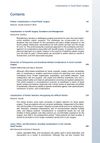 January 2018 in “Springer eBooks”
January 2018 in “Springer eBooks” PDE inhibitors, especially PDE4 inhibitors like apremilast, are effective for certain inflammatory skin conditions but have side effects and can be costly.
 November 2013 in “Facial Plastic Surgery Clinics of North America”
November 2013 in “Facial Plastic Surgery Clinics of North America” The document concludes that careful techniques, proper patient selection, and management strategies are crucial to minimize complications in facial plastic surgery.

PEGylated liposomal doxorubicin improves cancer treatment effectiveness and reduces side effects like heart damage and hair loss.
[object Object]  253 citations,
April 2014 in “Drugs”
253 citations,
April 2014 in “Drugs” Teriflunomide helps reduce multiple sclerosis symptoms and is safe for most patients.
 112 citations,
January 2014 in “Molecular and cellular therapies”
112 citations,
January 2014 in “Molecular and cellular therapies” Blocking the Wnt pathway could lead to new treatments for cancer and tissue repair but requires careful development to avoid side effects.
 38 citations,
March 2017 in “Expert Opinion on Investigational Drugs”
38 citations,
March 2017 in “Expert Opinion on Investigational Drugs” Bimatoprost is promising for treating some types of hair loss but needs more testing for androgenetic alopecia.
 14 citations,
April 2017 in “American Journal of Transplantation”
14 citations,
April 2017 in “American Journal of Transplantation” Skin problems from transplant drugs are common and need careful management in organ transplant patients.
 7 citations,
January 1994 in “Annual Reports in Medicinal Chemistry”
7 citations,
January 1994 in “Annual Reports in Medicinal Chemistry” Understanding how androgens work is key for creating new treatments for prostate issues and hair/skin conditions.
 4 citations,
June 2013 in “The Journal of Rheumatology”
4 citations,
June 2013 in “The Journal of Rheumatology” The document concludes that various findings in rheumatology offer insights into disease severity, treatment responses, and potential risks in medication, with some limitations due to unspecified participant numbers.
 January 2020 in “Journal of The European Academy of Dermatology and Venereology”
January 2020 in “Journal of The European Academy of Dermatology and Venereology” In 2019, dermatology and venereology improved skin cancer imaging, advanced in treating skin conditions like psoriasis, and explored the skin microbiome's role in diseases.
[object Object]  10 citations,
May 2020 in “Journal of The American Academy of Dermatology”
10 citations,
May 2020 in “Journal of The American Academy of Dermatology” Taking spironolactone doesn't increase the chance of breast cancer coming back.
132 citations,
November 1998 in “Journal of the American Academy of Dermatology” Topical sensitizers have mixed success in treating alopecia areata.
 August 2024 in “Archives of Dermatological Research”
August 2024 in “Archives of Dermatological Research” Low-dose oral minoxidil is effective and safe for treating androgenetic alopecia.
5 citations,
May 2018 in “European journal of pharmacology” Fesoterodine is effective and safe for elderly patients with overactive bladder.
 1 citations,
January 2024 in “Journal of Cutaneous and Aesthetic Surgery”
1 citations,
January 2024 in “Journal of Cutaneous and Aesthetic Surgery” Fractional CO2 laser with topical triamcinolone is more effective and safer for treating alopecia areata than intralesional triamcinolone.
October 2006 in “Dermatologic Surgery” Combining eflornithine cream with laser therapy effectively reduces unwanted facial hair in women.
90 citations,
February 2000 in “Dermatologic Surgery” Alexandrite laser hair removal is safe for darker skin tones.
53 citations,
August 2014 in “Cochrane library” Methotrexate is not proven effective for inducing remission in ulcerative colitis.
 October 2024 in “International Journal of Research in Dermatology”
October 2024 in “International Journal of Research in Dermatology” Tofacitinib is a promising and safe treatment for moderate to severe alopecia areata.
November 2023 in “Bioengineering” AMT® is effective and safe for early-stage knee osteoarthritis.
11 citations,
January 2019 in “International Journal of Trichology” Mesotherapy is not significantly better than minoxidil for treating male hair loss.
8 citations,
January 2019 in “Clinical research and trials” Finasteride is effective and safe for long-term treatment of hair loss in Japanese men.
 2 citations,
October 2020 in “The Journal of clinical and aesthetic dermatology”
2 citations,
October 2020 in “The Journal of clinical and aesthetic dermatology” The herbal mix (Biochanin A, Acetyl tetrapeptide-3, and Ginseng Extracts) and the 3% Minoxidil solution are equally effective in treating hair loss, but the herbal mix has fewer side effects.
 2 citations,
July 2023 in “Journal of cosmetic dermatology”
2 citations,
July 2023 in “Journal of cosmetic dermatology” JAK inhibitors are more effective and safer for treating alopecia areata than dupilumab and apremilast.
Minoxidil alone is as effective as combining it with PRP for treating female pattern hair loss.
June 2022 in “International Journal of Research in Dermatology” Injectable platelet-rich fibrin is a safe and effective treatment for hair loss.
39 citations,
September 2015 in “Clinical Therapeutics” Teriflunomide effectively reduces relapse rates and disease progression in multiple sclerosis but is not safe for use during pregnancy.
2 citations,
February 2021 in “Case reports in dermatological medicine” The new topical botanical formulation significantly regrew hair in all five patients without side effects.
 July 2024 in “Journal of Cosmetic Dermatology”
July 2024 in “Journal of Cosmetic Dermatology” Fractional laser therapy is a promising, effective, and minimally invasive treatment for hair loss.
 August 2023 in “Skin Research and Technology”
August 2023 in “Skin Research and Technology” Platelet-rich plasma (PRP) may improve healing in chronic wounds and vitiligo and promote hair regrowth, but more research is needed.

















